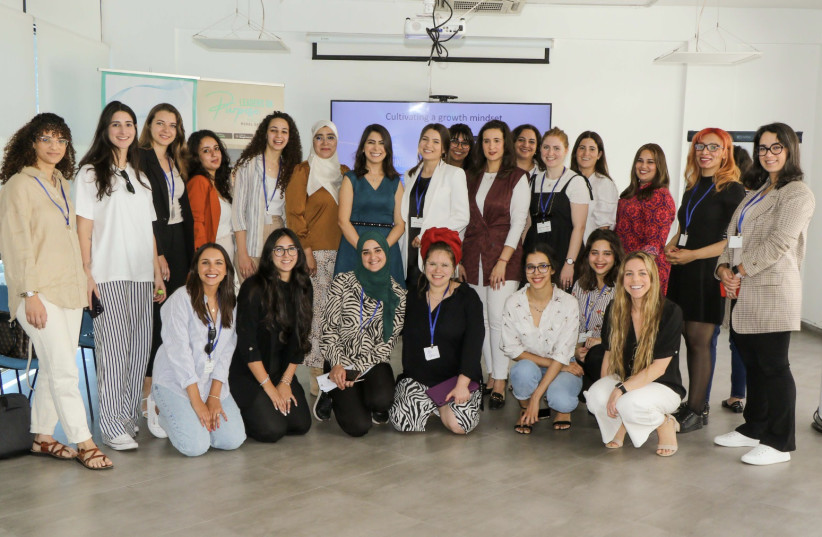Abraham Accords empower tech women’s growth – opinion
Women in tech companies all over the world often face the broken-rung problem—the struggle to break through to managerial positions from lower-level jobs. Despite modest gains in representation over the last few years, women, especially women of color, are still dramatically underrepresented in the corporate workforce. This dynamic is especially true in senior leadership: Only one in four C-suite leaders is a woman, and only one in 20 is a woman of color.
In 2020, Israel created FemForward, the country’s first junior-to-manager program designed to address the broken-rung problem. The same year, the Abraham Accords were signed, establishing relations between Israel and the United Arab Emirates and Bahrain, soon followed by Morocco. In May of this year, the first FemForward MENA cohort was launched in Morocco, aiming to build business connections between women in the Abraham Accords countries. This culminated in a bilateral Israel-Morocco summit held in Jerusalem this month, with 23 women from both countries’ tech sectors taking part, including the two of us.
In addition to shaping our two countries, the Abraham Accords have also had a direct impact on us personally, by introducing us to each other and providing a cohort with whom to grow in our careers.
As a Moroccan woman, Milouda has been empowered by FemForward to seek a more significant role in the male-dominated tech world. She is leaving the program more determined than ever to make her voice heard.
As an Israeli woman, Katrin has had her eyes opened to the similarities in the challenges faced by women in workplaces around the world, including their similar struggles with the fear of asserting themselves to demand deserved promotions.
 The Fem Forward 2023 cohort in Morocco (credit: Fem Forward)
The Fem Forward 2023 cohort in Morocco (credit: Fem Forward)The three-month FemForward MENA program started in Casablanca, where we met in person for the first time. It was the first time some of the Israelis had visited Morocco and met with Moroccans, despite one in every nine Israelis being of Moroccan heritage. Following our meeting in Casablanca, we participated in weekly online lectures and a mentorship program. The program concluded this month with a four-day seminar in Israel.
The course included lectures by leading female executives, including Asi Messica, vice president of data science at Lightricks, Fleur Hassan-Nahoum, deputy mayor of Jerusalem and co-founder of the UAE-Israel Business Council, which co-sponsored the cohort, and female leaders from Google, McKinsey, and other top companies.
We learned so many things, such as techniques for better designing advocacy campaigns and lobbying efforts for women’s rights.
Individually, Milouda learned to advocate for career advancement and successfully negotiated her desired salary and benefits for a position in a Middle East startup.
Katrin learned the importance of speaking about her value at work. While many women believe that putting in extra hours and going above and beyond speak for themselves, this assumption is often far from reality. Employers and decision-makers need clear communication of an employee’s achievements to notice her value. Katrin walked away from the program with new tools in her toolkit.
A chance to learn about new cultures
In addition to the learning and mentorship that took place throughout the program, the visits we each took to each other’s countries provided a wonderful way to learn about the culture and people of the country, which we did not have direct access to beforehand. These visits were filled with unforgettable moments in which we forged deep connections and lasting friendships. Most importantly, we left the program as great friends and with an important community to support each other’s career journeys.
Milouda was amazed by the fact that so many Israelis speak Moroccan Arabic fluently. She was also deeply impressed by the tech ecosystem in Israel and the hands-on government investment to support innovation.
Katrin’s experience in Casablanca at the beginning of the program completely changed her perspective on Morocco and its people. Although she used to think that Morocco was mostly just a beautiful country and a tourist destination, while there, she learned that the country is also a great tech hub with leading high-tech companies. In Casablanca, she found herself surrounded by highly professional and successful people who were always willing to help.
Through our shared struggles and career aspirations, we, Israeli and Moroccan women, came together, fostering a genuine friendship. This partnership has shown the importance of breaking down barriers and building bridges of understanding and support between women from different parts of the world.
We have each gained so much from this program that goes beyond the professional mentorship that we came for. Katrin was motivated to create an initiative that helps Ukrainian women who fled the war to Israel. Milouda started a joint Moroccan-Israeli project with a cutting-edge virtual reality company and a renowned dance house. By combining Moroccan and Israeli folklore in a virtual reality film, she hopes to bridge the two cultures and foster mutual understanding.
FemForward created a unique connection between Moroccan and Israeli women. It serves as living proof that empowering women knows no boundaries, and we are incredibly grateful for this experience and our community.
Milouda Bouichou is a data scientist at Agence de Développement du Digital in Morocco. Katrin Bondarieva is a marketing communications coordinator at Stonehenge Digital in Israel. They both took part in FemForward’s first MENA cohort, which concluded in August 2023 in Israel.





Comments are closed.